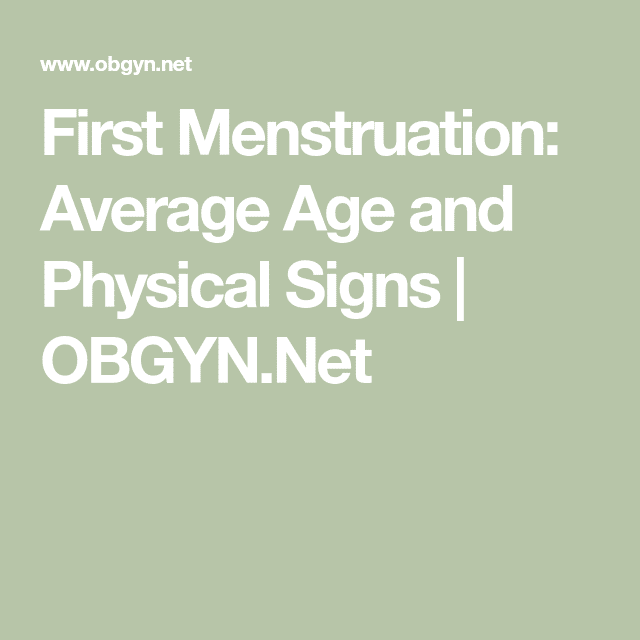What Do I Need To Do To Prepare For My First Period
There is nothing in particular you need to do to prepare for your first period, besides having feminine hygiene products and over-the-counter pain relievers such as ibuprofen or naproxen on hand. If you happen to get your period with no access to menstrual products, toilet paper will work in an emergency. If you get your first period at school, your teacher or school nurse will have a pantiliner or pad on hand.
There are a variety of menstrual products available to you:
Disposable pads
These absorbent pads have an adhesive backing that sticks to the inside of your underwear. They are available in different lengths and absorbencies, and some have adhesive wings that wrap around the sides of your underwear. Disposable pads should be changed every 4-6 hours and are thrown out after a single use.
Pantiliners
These are small, thin, disposable absorbent pads that can be used on their own on days of light flow. They can also be used in combination with a tampon, in case of leaks or discharge.
Reusable pads
These are usually made of cotton, bamboo, or other natural absorbent fibres, and are often available at health food stores. They can be washed with detergent and reused. Some have velcro tabs to secure them around your underwear.
Tampons
Menstrual cup
Teach Her About Hygienic Menstrual Practices
Also, teach your daughter about the various stringent hygienic practices that she must resort to during her periods.
You can let her know about the various menstrual hygiene products like feminine washes, menstrual sponges, and sanitary napkins that are available in the market and describe the pros and cons of each.
Now, let her choose her comfort zone. You are comfortable with tampons does not imply that she will also have similar preferences.
If there occur issues regarding schedules and regularities with the periods, it is always better to consult a gynecologist.
You as a parent should never try the medications that you take on your daughter. It is not at all a good practice.
What Does It Feel Like
You may experience some cramping or discomfort in your tummy, but otherwise the bleeding part itself shouldnt be painful. A lot of women explain it as feeling like a trickling sensation.
You may experience some other symptoms along with your period – like abdominal cramping or hormonal skin break-outs – which are often associated with what’s known as pre-menstrual syndrome, or PMS. More about that a bit further on…
Also Check: Why Is My Period A Month Late
What Are Period Symptoms And How Do I Deal With Them
PMS stands for Premenstrual Syndrome. Its when the hormones that control your menstrual cycle cause changes in your body and emotions around the time of your period.
Some of the most common PMS symptoms are:
Some people get PMS every time they have their periods. Others only get PMS every once in awhile. You may have all or just some PMS symptoms. And some people don’t get PMS at all. Learn more about PMS.
Cramps are one of the most common symptoms to have before/during your period. They can be super painful, or just a little annoying. You can calm cramps by taking pain medicine . Putting a heating pad where it hurts, taking a hot bath, exercising, or stretching your body can also help. Learn more about how to deal with cramps.
Certain types of birth control like the pill, shot, implant, and IUD can help with PMS and other period problems. If your PMS is so bad that its hard to do normal activities during your period, talk to an adult you trust or your family doctor. You can also call your local Planned Parenthood health center. You shouldnt have to suffer every month, and they can help you find the cause and get treatment.
Introduce A Period Tracker To Her

Inculcate the practice of period tracking in your daughter. It will help a lot later on. Make her understand how to do it. If required, you practice the same along with her to make her realize the importance of tracking.
Take her out and try to uplift her mood during the periods. There can be no better friend than a parent. During such a sensitive time as the first periods, you need to motivate her.
Do not make your daughter feel that something disastrous has happened or she is impure or anything like that.
Any girl during menarche is already in an extremely distressful situation full of anxiety.
As parents, it is your duty to relieve her of the stress and not add up to it.
Periods are a normal physiological condition. It is nothing weird or absurd. Happy periods to all the lovely ladies reading this post. Keep smiling!
You May Like: Are You Fertile After Your Period
What Does A First Period Look Like
In terms of what to expect when your daughter gets her first period, Dr. Webzell explains: The first period may present as darker blood, is often light in flow, and presents as spotting. Spotting describes light bleeding outside of a normal period.
A first period may initially look like brown or pink discharge that turns into more distinctive red blood, but this often isnt indicative of how it will be once it settles down. A first period can differ from one person to another. There is no right first period, says Dr. Twogood. However, its typically not super heavy. Its also normal to have irregular periods duringthe first few years. So someone may have their first period and then not have another period for several months. If you or your child is worried about their cycle, theres more information below about when to reach out to your health care provider.
Can A Girl Get Pregnant As Soon As Her Period Starts
Yes, a girl can get pregnant as soon as her period starts. A girl can even get pregnant right before her very first period. This is because a girl’s hormones might already be active. The hormones may have led to and the building of the uterine wall. If a girl has sex, she can get pregnant, even though she has never had a period.
You May Like: How To Skip A Period Naturally
Period Symptoms And Pain
When your childs period is coming, they might have a range of physical symptoms, including sore breasts, pimples and greasy hair. Your child might also have a sore tummy, feel sick or have diarrhoea.
Period pain and these associated symptoms are common. If your child gets a sore tummy, back or legs before or during their period, your child could try:
- taking pain medication
- putting a hot water bottle on their lower stomach
- walking or other light exercise
- eating smaller meals more often
- resting and relaxing, particularly with their legs elevated, or lying on one side with knees bent
- lightly massaging the lower stomach
- having warm drinks like hot milk or herbal tea.
Very painful periods are common, as are symptoms like nausea, vomiting and diarrhoea. But if your child has period pain that disrupts everyday activities, they should see their GP. Hormone treatments that regulate periods or even turn them off for a while are safe and very effective.
Key Signs That Your Daughter Is About To Start Her Period
Opening up a conversation with your child about puberty and periods before they actually start their period could help them prepare for the changes that are to come. But rest assured this doesnt need to turn into The Talk
Instead, ask them what they already know or have experienced. Use articles and apps to educate both of you and dont be afraid to find things out together.
A first period is usually expected about two years after breast buds start forming, explains Dr. Twogood. That is a good marker for parents because breast buds are usually fairly noticeable. Vaginal discharge is also usually noticed about 6 to 12 months before a period starts. Around this time, your child might also experience a growth spurt.
Recommended Reading: What Happens When You Have Sex On Your Period
How Do I Manage Symptoms
If your cramps are bothering you, there are a few remedies that can help:
- Take a warm bath.
- Place a heating pad or warm washcloth on your belly.
- Take medicines that contain ibuprofen or naproxen .
Dont take aspirin for your cramps unless your provider says its OK. Aspirin has been linked to a rare condition calledReyes syndromein people under 18.
What Are The Signs Of An Abnormal Period And When Should We Talk To Our Pediatrician
Abnormal periods can be caused by everything from lifestyle factors such as stress and exercise levels to underlying medical conditions such as a bleeding disorder or hormonal abnormalities. It can take a few years for the menstrual cycle to stabilize, so it might not be obvious right away if your child is experiencing abnormal periods, but there are some signs that you can watch out for.
Make an appointment for your child to see their pediatrician if you observe any of the following:
- Reaching the age of 15 without having a period
- Having a period before the age of 8
- Experiencing irregular cycles more than two years after starting their period
- Experiencing very heavy bleeding or severe cramps that dont improve with painkillers
- Having very long periods
- Experiencing severe PMS symptoms that make it hard for your child to get through their day
These symptoms dont necessarily indicate that anything is wrong, but its good to speak with a healthcare provider just to make sure. A healthcare provider can help you and your child determine what next steps need to be taken to ensure their health and wellbeing.
If your child also has other types of bleeding such as nosebleeds, frequent gum bleeding, easy bruising or bleeding after tooth extraction or surgery, or any family history of bleeding, you may want to discuss with your pediatrician whether testing for an inherited or acquired bleeding disorder is needed.
Don’t Miss: How To Make Your Period Stop For A Day
Your First Period Guide: Age Symptoms Duration & More
If youâre looking to learn more about when to expect a first period or how to manage it, congratulations on being prepared! Knowing what to expect when getting your period and having accurate information can really increase confidence and decrease worries as puberty progresses and first periods arrive! So whether youâre preparing for your first period or youâve already started and just want to learn more about it, weâve got you covered.
Jillian Michaels: 5 Ways To Control Pms

Open the Lines of Communication
Instead of having a formal menstruation “talk” with your daughter, try opening up the dialogue and, openly and honestly, asking your daughter about her questions.
Here are some suggestions for answering your daughter’s questions about menstruation:
The more information that you share with your daughter about periods and PMS symptoms, the more comfortable and prepared she will feel as her body grows and changes.
Don’t Miss: What Is Considered A Late Period
First Menstruation: Average Age And Physical Signs
When will girls get their first period? The ages vary, but there are two signs of puberty that generally precede first menstruation.
Physical Signs That Precede First Menstruation
While girls vary in the ages that they are when they start their periods and when the other signs of puberty occur, the order is fairly consistent. The two things that are most closely tied to the age when a girl starts her periods, that she can readily assess herself are: first real bra and armpit hair. A “real” bra means one with a cup size attached to it, as opposed to small, medium, large distinctions. Armpit hair is self-explanatory. Any amount will do. At this point, a girl will probably start her periods within 3-6 months, if she hasn’t already.
It also occurs right after the growth spurt of adolescence. So, if a girl grew, grew, grew, last year and has slowed down then periods are right around the corner.
Average Ages And Average Time Between Stages
Take this as the starting point or adolescence. Here is the sequence and time frame of events for an average girl. The girl will also begin her growth spurt about this time. She will notice pubic hair about 6 months later. About 6 months after that she will be in her peak growth spurt, growing faster that she ever has. She will probably get her first training bra at this time. About a year after all this , she will get a real bra and armpit hair. First period will come about 4 months before or after these events.
Who Is This Quiz For
The quiz is designed for girls aged over the age of 8 years who have not yet started their periods, but who have started to show some signs of puberty. It consists of seven simple questions relating to changes in your body that might indicate your period is on its way.
Each time you select an answer you will be given some information about the symptoms you are experiencing and what they might mean and, at the end, your result will give you an indication of whether your first period might be on its way.
Quiz: When will I get my first period?
Also Check: How To Know When Your Period Is Coming Again
What Will My First Period Feel Like
You may find your first period comes and goes with very little in the way of symptoms, or you may find you experience quite a bit of discomfort. Common symptoms include:
- Cramping in the lower abdomen
- Breast tenderness
- Diarrhea or nausea
Most of these symptoms do not last long, and can be treated with ibuprofen or other over-the-counter pain relief medications. A heating pad or hot water bottle on the abdomen or lower back can help ease pain in these areas. More details on menstrual pain and other symptoms can be found here .
When To Speak With A Doctor
People may wish to see a healthcare professional if they have PMS symptoms that affect their daily life, if the symptoms occur outside of their period, or if they experience any sudden or dramatic changes to PMS or period symptoms.
If a person expects to have a period, but it does not arrive, it is best to speak with a healthcare professional about the potential causes. They may recommend a pregnancy test if someone could be pregnant or other tests if pregnancy is not the cause.
Heavy bleeding and severe abdominal cramping can indicate pregnancy complications, such as pregnancy loss or ectopic pregnancy. Contact a provider immediately if a pregnant person experiences any of the following symptoms:
8 sourcescollapsed
- Bai, G., et al. . Associations between nausea, vomiting, fatigue and health-related quality of life of women in early pregnancy: The generation R study.
Also Check: How To Stop Your Period From Being So Heavy
Mood Changes Before And During Periods
Many people will experience mood changes just before or during the first few days of their periods. These changes can include being a bit irritable or more sensitive, or feeling angry, anxious or even depressed.
This can be hard for your child and the rest of the family to cope with. Giving your child a bit more privacy and space around this time can make it easier for everyone, without making a big deal about it.
If your childs mood changes are upsetting or disrupting their everyday life, they might like to see a health professional, like the GP.
Your First Period Kit Be Prepared
Periods are completely natural bodily process. There is nothing you can do about it except for preparing for it.
If you are apprehensive that your first period is approaching, you must get hold of an emergency periods kit.
This lit should be functional and most importantly ready at hand. You might need it any tine, so make it portable and easy to access.
Recommended Reading: Why Am I Having Irregular Periods
How Do I Use A Tampon
Inserting a tampon for the first time can be a bit of a challenge. Its hard to know exactly how to position your body and at what angle to put the tampon in. After a few tries, you will figure out what works best for you. Its best to use slender size tampons when you are learning. If you arent exactly sure where your vaginal opening is, use a mirror to have a look at your vulva .
To insert a tampon that has an applicator:
To insert a tampon without an applicator:
You’ve Recently Had A Big Growth Spurt

You May Like: How Many Days After Ovulation Does Period Start
